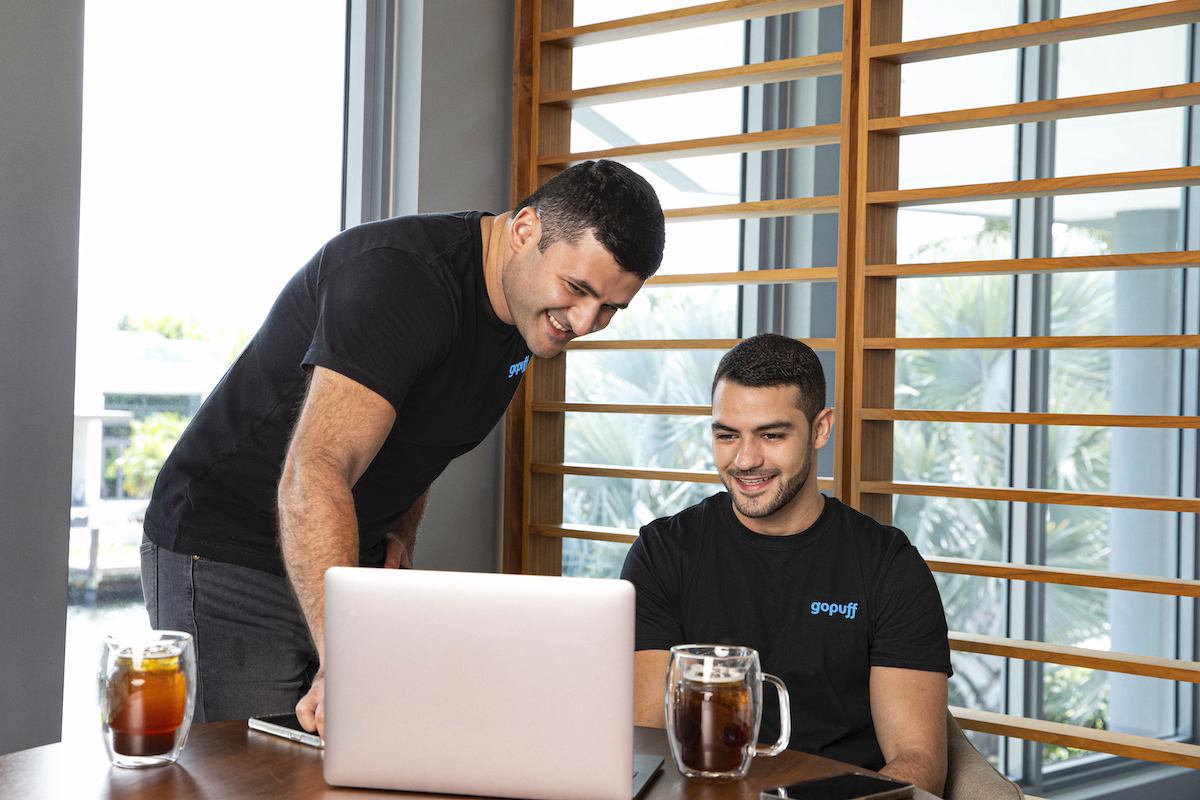A few weeks before the pandemic hit the Philadelphia region, Philly Startup Leaders held what would become one of the last large gatherings of Philly tech for a long, long time.
Attendees gathered shoulder to shoulder at Harp & Crown in late February 2020 to talk fundraising, growing a company, and the highest and lowest moments of building a startup. The local entrepreneurship group had partnered with West Coast VC firm Accel as it courted tech companies outside of the Bay Area bubble.
During a panel at the event, Gopuff cofounder Yakir Gola sat among serial entrepreneurs Bob Moore, Rick Nucci and Michael Vaughan. The group talked about their favorite burgeoning startups. But no one mentioned the news of Gopuff’s recent, secret $750 million SoftBank investment.
Gopuff was already on the precipice of becoming a very big deal within the Philly tech community, and likely, the country. But the pandemic accelerated the on-demand delivery company’s growth. Within the last year, it’s scooped up droves of smaller, international companies in the same industry, expanded officially to the UK, and set up thousands of micro-fulfillment centers across the US.
When it raised $1.15 billion early this year, it hit unicorn status with a nearly $9 billion valuation. When investors quickly followed on with another $1 billion in July, the company was valued at $15 billion. Philly had long prayed for a tech unicorn, as Technical.ly wrote early last year. And it’s clear Gopuff was comfortable taking that title.
This week, news broke that actress Selena Gomez had invested in the Callowhill-headquartered company. Soon after, TechCrunch reported that Gopuff was on the brink of raising another $1.5 billion deal, at a $40 billion valuation. The fundraise is reportedly structured as a convertible note with the likelihood of a 2022 IPO on the horizon. A Gopuff spokesperson did not comment on the validity of the reports.
We’ve had our eyes peeled for other tech unicorns to go public in the months to come. After its $100 million raise earlier this year, HR tech company Phenom’s CEO, Mahe Bayireddi, indicated it will going public soon — “there’s no doubt,” he said in April.
But first up may be Gopuff. What would an IPO for Philly’s quickest-growing tech company mean for the startup ecosystem here?

It’s a natural part of the evolution of Philly’s tech community to have a consumer company like Gopuff established and scaling here, said Dean Miller, president of PACT.
“We have many incredible entrepreneurial stories in our region across all sectors including tech but not many national or global recognizable consumer-facing brands,” he told Technical.ly. “Gopuff is certainly on their way to helping to change that and have already inspired many other entrepreneurs to follow their lead.”
Moore, the Crossbeam CEO who sat next to Gola that February evening at Harp & Crown, said the IPO possibility is very exciting for Philly, if it pans out to be true.
“A big liquidity event can create a startup ecosystem flywheel,” Moore said. “Not only is it an important milestone for the company itself, it also helps educate and fund the next generation of founders, investors, and thought leaders.”
Having a success story of this magnitude is something that Philadelphia's tech community needs.
That idea — that one Philly company succeeding helps other local companies succeed — rang true to Nico Westerdale. Now a “fractional CTO,” Westerdale spent two and a half years building at Gopuff, including one as its director of engineering. He remembers being aware of growth plans early on.
“I remember walking into the Gopuff office on Buttonwood Street three years ago, it was a cramped office, and I talked to [technical team leaders] Sree [Kotay], Aaron, Ethan and Jack about what the job might be like and some of the plans for engineering that they had,” Westerdale said. “Looking at the whiteboard I saw the tasks written up for the week, and there was something in the air. I talk to a lot of startups, and I could tell even back then that Gopuff was onto something intangible, and it could be big.”
Seeing rumors swirling about a possible IPO would have thrilled the then-engineering department, he said. The moment of going public itself is fleeting, Westerdale said, and it doesn’t solely define a company. But, as we similarly heard from Pittsburgh leaders when Duolingo went public this summer, it’s a good marker of where the company is going, and what could exist for others in its space. It also draws in the type of tech talent that can build locally for internationally growing brands.
“Having a success story of this magnitude is something that Philadelphia’s tech community needs,” Westerdale said. “It’s that pin in the map, the one big data point that we can all point to that says, no, it does not have to be San Francisco, New York or Austin that births the brand name on everyone’s lips.”







